Why Do Slugs Die from Salt? The Surprising Science Behind It
Table of Contents
Introduction
Slugs are strange creatures that many people don’t understand very well. You can often find them in gardens, where they like to eat plants and hide in damp places. They move slowly and leave a slimy trail behind them. Slugs are soft, squishy animals that need moisture to stay alive. This is why they are very sensitive to salt, which can be dangerous for them. But why exactly does salt kill slugs? In this blog post, we will explore why slugs die from salt and what happens to them when they are exposed to it.
Salt is something we commonly use in our homes, but it can cause serious harm to slugs. It has a powerful effect on their bodies and can dry them out quickly. Slugs need water to survive, and without it, they can’t function properly. When salt touches a slug, it starts pulling water out of their bodies, causing them to become dehydrated. This can lead to their death, which is why it’s important to understand how salt affects them.
In the next sections, we will take a closer look at how salt works on slugs and why wet environments are so important for their survival. We will also talk about some natural ways to keep slugs away from your garden without harming them. By learning more about slugs, we can find better, safer solutions for dealing with these garden visitors.
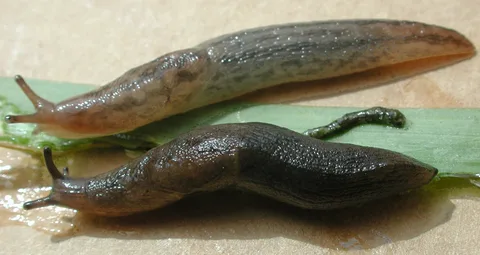
What Happens When You Put Salt on a Slug?
When you put salt on a slug, something very dramatic happens. The slug begins to lose water quickly because salt absorbs water. Slugs have moist bodies, and they need this moisture to survive. When salt touches their skin, it pulls the water out, leaving the slug dehydrated. This causes the slug to start shrinking and eventually die.
Slugs rely on a wet, slimy coating to move around and stay healthy. This slimy layer is mostly made of water, which is why salt is so harmful. The salt disrupts this balance by sucking the water from the slug’s body. Without enough water, the slug’s body can’t function, and it starts to dry out. This process happens fast, and the slug doesn’t have time to recover from the water loss.
As the salt continues to absorb water, the slug’s skin begins to crack and shrivel. The slug may try to escape or secrete more slime, but it won’t be enough to protect it. The more salt there is, the quicker the slug dehydrates. This is why slugs die from salt so easily – they just can’t handle losing so much water all at once.
The salt not only pulls water from the slug’s surface but also affects its internal organs. Slugs need water for their organs to work properly, and when they lose too much, their organs start to fail. This is another reason why slugs can’t survive after coming into contact with salt. Their bodies just don’t have enough water left to keep everything working.
In the end, the slug becomes completely dehydrated and dies. The process may seem simple, but it’s all due to the science of osmosis, where water moves from the slug’s body into the salt. This explains why slugs die from salt and why it happens so quickly when you sprinkle salt on them.
Why Do Slugs Die from Salt: The Science Explained
Slugs die from salt due to a scientific process called osmosis. Osmosis is when water moves from an area of high concentration to an area of low concentration. Slugs have soft, moist bodies that are mostly made up of water. When salt touches the slug’s skin, it creates an area where there’s very little water outside the slug. This makes water move out of the slug’s body and into the salt.
The process of osmosis happens very quickly, and slugs can’t stop it. Slugs need water to survive because it keeps their organs working and their bodies hydrated. When salt touches them, the water rushes out, leaving the slug dehydrated. This is why slugs die from salt so fast – their bodies lose water faster than they can replace it.
As the water leaves the slug’s body, it starts to shrink and shrivel. The slug’s moist skin begins to dry out, and without enough water, its organs stop working properly. This is why the slug appears to melt or collapse when you sprinkle salt on it. The salt is literally pulling the water out of the slug, which causes it to die.
Slugs are especially vulnerable to salt because they have no way to protect themselves from losing water. Unlike animals with thicker skin or shells, slugs rely on their slimy coating to keep water inside. Salt breaks through this coating and dehydrates the slug quickly. This is what makes salt so deadly to slugs, even though it seems harmless to humans.
In conclusion, slugs die from salt because osmosis pulls water out of their bodies. Without enough water, the slug’s organs can’t work, and it quickly dies. This is a natural process that explains why salt is so harmful to slugs and why it kills them in such a short time.
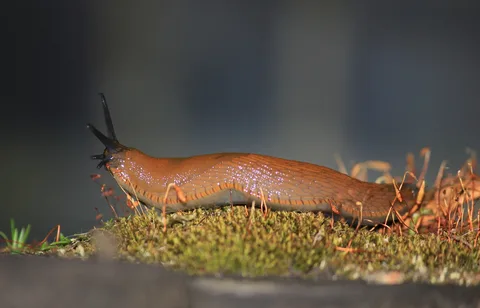
How Does Salt Kill a Slug?
Salt kills a slug by causing it to lose water rapidly. Slugs have very moist, soft bodies, and they need water to survive. When salt touches a slug, it pulls the water out of the slug’s skin through a process called osmosis. This happens because the salt creates an area of low water concentration outside the slug, so the water inside the slug moves out to balance things.
Once the water starts leaving the slug’s body, the slug quickly becomes dehydrated. This dehydration is what kills the slug. As the water is drawn out, the slug’s body begins to shrink and dry up. It loses its slimy coating, which is essential for its movement and survival. Without enough water, the slug’s organs stop working properly, and the slug eventually dies.
The salt not only pulls water from the outside of the slug but also affects its internal organs. Slugs need water for their internal functions, such as digesting food and breathing through their moist skin. When the slug loses too much water, its organs can’t work, which leads to death. This is why slugs die so quickly after coming into contact with salt.
The slug tries to produce more slime to protect itself, but it can’t make enough to counter the effects of the salt. The more salt that is applied, the faster the slug loses water, and there’s no way for the slug to recover. This is why even a small amount of salt can be deadly to slugs in just a short amount of time.
In conclusion, salt kills slugs by dehydrating them. The salt absorbs the water from their bodies, leaving them unable to function. The process is fast and deadly, and it’s all due to the slug’s need to keep its body moist for survival.
The Role of Water in a Slug’s Survival
Water plays a critical role in a slug’s survival. Slugs have soft, moist bodies that rely heavily on water to stay healthy and function properly. Their skin must remain wet for them to move easily and breathe, as they absorb oxygen through their moist skin. Without enough water, slugs cannot survive because their entire body depends on staying hydrated.
Slugs also produce slime, which is mostly made of water, to help them move around. This slime helps slugs glide over rough surfaces and protects them from harm. Without water, slugs would not be able to make enough slime, which would make it difficult for them to move and escape predators. The slime also keeps their bodies moist, which is essential for their survival.
Another important reason water is vital for slugs is that they lose water easily, especially in dry or hot environments. Since they have no shell or hard covering like snails, slugs are more exposed to the elements. This makes them very vulnerable to drying out. To avoid dehydration, slugs prefer to live in damp, wet environments, such as gardens or under rocks, where there is plenty of moisture to keep their bodies hydrated.
Water is also crucial for the internal functions of a slug’s body. Their organs need water to work properly, including their digestive system. Slugs eat soft, moist plants, and without enough water, they would not be able to process their food. If they lose too much water, their organs stop functioning, which can lead to their death.
In conclusion, water is essential for a slug’s survival. It helps them move, breathe, and stay healthy. Without enough water, slugs cannot survive, which is why they live in moist areas and avoid dry, hot places. Water is the key to their survival in the environment.
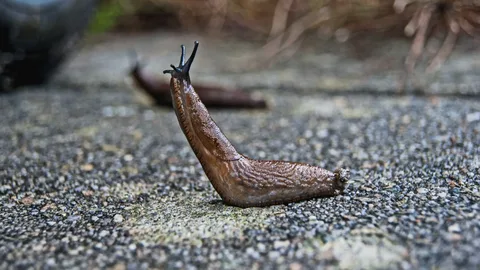
Why Salt Is Deadly for Slugs but Not for Humans
Salt is deadly for slugs, but it doesn’t harm humans in the same way. The reason salt is so dangerous for slugs is that they have soft, moist bodies that are highly sensitive to losing water. When salt touches a slug, it pulls the water out of its body through a process called osmosis. The slug quickly loses moisture, becomes dehydrated, and eventually dies because it cannot replace the water fast enough.
In contrast, humans have thick skin that protects them from the effects of salt. Human skin acts as a barrier, so when salt touches our skin, it doesn’t cause water to leave our bodies the same way it does with slugs. Humans can also drink water and stay hydrated, which helps balance the effects of salt. This is why salt doesn’t harm humans when we touch it.
Slugs don’t have the same protective skin or ability to replace lost water as quickly as humans do. They rely on moisture to breathe and move, and without it, they can’t survive. When salt dehydrates them, their organs stop working, and they can’t function properly. This makes salt deadly to slugs, while humans are more resilient to its effects.
Humans also use salt in food, and while too much salt can be unhealthy, it doesn’t kill us instantly. Our bodies can process and filter out excess salt through our kidneys. Slugs, however, have no such system to handle salt, so even a small amount can cause severe dehydration and death. This difference is why salt is so dangerous to slugs but not to humans.
In summary, salt is deadly to slugs because it rapidly dehydrates them, while humans are protected by thicker skin and better water balance. Slugs are much more vulnerable to salt because they rely on their moist bodies to survive, whereas humans have a more complex system to manage the effects of salt.
What Is Osmosis and Why Do Slugs Die from It?
Osmosis is a natural process where water moves from an area of high concentration to an area of low concentration through a thin membrane. In the case of slugs, their soft, moist bodies are filled with water. When salt is sprinkled on them, it creates a low water concentration outside their bodies. Osmosis causes the water inside the slug to move out, trying to balance the concentration of water between the inside and outside.
As water leaves the slug’s body due to osmosis, the slug begins to dehydrate. Slugs rely on moisture to survive, as it helps them breathe through their skin and produce slime for movement. When they lose too much water through osmosis, they cannot maintain their bodily functions. This extreme dehydration is what causes slugs to die from salt.
Osmosis happens very quickly when salt is involved because salt absorbs water rapidly. The slug cannot stop the process, and even if it tries to produce more slime to protect itself, the salt continues to draw water out of its body. Without enough water to keep their organs working, slugs become weak and die. This is why slugs die from osmosis when exposed to salt.
Humans, on the other hand, do not suffer from osmosis in the same way because our skin is much thicker, and our bodies have ways to maintain water balance. But for slugs, their thin, permeable skin makes them vulnerable to osmosis. This explains why salt is so deadly to slugs but doesn’t harm humans in the same way.
In conclusion, osmosis is the movement of water from areas of high concentration to low concentration, and slugs die from it because salt causes them to lose water rapidly. Without enough water, slugs cannot survive, which is why salt has such a harmful effect on them.
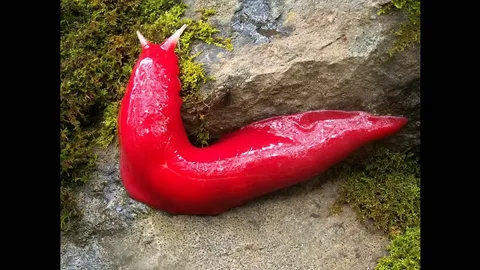
Are There Other Ways Slugs Can Die from Losing Water?
Yes, slugs can die from losing water in other ways besides salt. One common way is through dry, hot weather. Slugs have moist bodies, and they need to stay hydrated to survive. When the air is dry or the temperature is too high, slugs lose water quickly through evaporation. If they can’t find a damp place to hide, such as under rocks or in shaded areas, they may dehydrate and die.
Another way slugs can lose water is through strong winds. Wind can dry out the moisture on a slug’s skin, especially if the environment is already dry. Slugs often come out at night or during rainy days because they are less likely to lose water in these conditions. When the weather is windy, slugs may struggle to stay hydrated, and if they can’t find shelter, they can die from dehydration.
Slugs can also lose water if they are exposed to certain chemicals. Some garden products, like pesticides or fertilizers, can cause slugs to lose moisture. These chemicals can dry out the slug’s skin or interfere with their ability to produce slime, leading to dehydration. Even though these chemicals might not work as fast as salt, they can still harm slugs by reducing the moisture in their bodies.
Being in the sun for too long is another danger for slugs. Slugs prefer cool, shady environments because direct sunlight can cause them to overheat and lose water. If a slug is stuck in the sun without access to a moist place to hide, it can become dehydrated and die. This is why you usually see slugs coming out during the evening or after it rains, when it’s cooler and more humid.
In summary, slugs can die from losing water in many ways, such as dry weather, strong winds, chemicals, or too much sunlight. They need moist environments to survive, and if they lose too much water, their bodies can no longer function properly, leading to death.
Can Salt Harm Other Creatures the Way It Harms Slugs?
Yes, salt can harm other creatures in ways similar to how it harms slugs, though it may not affect all creatures in the same way. Like slugs, many animals depend on maintaining a balance of moisture in their bodies. Salt can cause dehydration in animals, especially those with soft, permeable skin, like slugs. Amphibians, such as frogs and salamanders, are also vulnerable to salt because they absorb water through their skin. When salt is present, it can draw water out of their bodies, causing dehydration and potentially leading to death.
Fish in freshwater environments are also at risk from salt. Freshwater fish live in water with very low salt concentrations, and their bodies are designed to keep a balance of water and salt. If too much salt enters their environment, such as from road salt or pollution, it can cause the fish to lose too much water. This can harm their internal organs, and in severe cases, it can kill them. Freshwater ecosystems are very sensitive to salt, which is why it’s important to keep salt out of these environments.
On the other hand, creatures like certain insects, such as ants, can sometimes tolerate salt better than slugs. While salt can still dehydrate them, they are often better equipped to handle it, and they can usually recover if they get back to a moist environment quickly. However, if they are exposed to high amounts of salt for a long time, it can still harm them, especially by damaging their outer layers or causing dehydration.
Animals that live in salty environments, such as sea creatures like crabs and clams, are naturally adapted to handle salt. They have special systems that allow them to process and balance salt in their bodies. However, even these creatures can suffer if the salt levels become too high. For example, if ocean water becomes too salty due to pollution, marine life can be affected and may struggle to survive.
In conclusion, salt can harm many creatures the way it harms slugs, especially those that live in moist environments or freshwater habitats. Dehydration caused by salt can have serious effects on these animals, and it’s essential to be mindful of salt pollution in natural habitats to protect these vulnerable species.
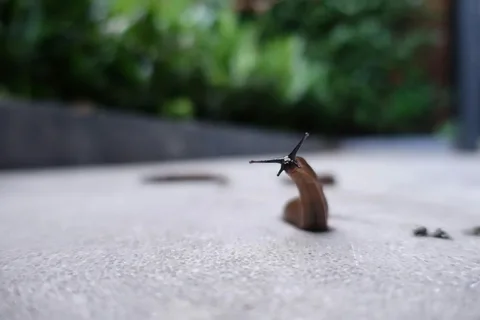
Why Do Slugs Die from Salt Faster Than Snails?
Slugs die from salt faster than snails because of the differences in their physical structures. One of the main reasons is that slugs do not have shells to protect them, while snails do. A snail’s hard, protective shell acts as a barrier, preventing salt from directly touching its soft body. This means that even when a snail is exposed to salt, the shell helps to limit how much salt can affect its skin. On the other hand, slugs, with their soft, exposed bodies, have no protection, and salt can quickly draw moisture out of their bodies.
Additionally, snails can retract into their shells when they sense danger, such as when they encounter salt. This ability to pull into their shells provides them with a temporary shield, reducing the amount of salt that comes into contact with their skin. In contrast, slugs are always vulnerable because they lack this shell to retreat into. When salt is applied to a slug, it affects the whole surface of their body, leading to rapid dehydration.
Another reason slugs die faster from salt than snails is that snails can sometimes resist dehydration for a longer period. Snails have a stronger, more protective outer layer called the “epiphragm,” a mucus membrane that can seal off their bodies during extreme conditions, such as dry weather or salt exposure. This layer allows snails to survive harsh conditions for a while, whereas slugs lack such a strong protective feature. Slugs are more susceptible to losing water quickly, leading to faster dehydration and death.
In terms of movement, snails can sometimes avoid direct contact with salt by moving slowly or hiding, thanks to their shells. Slugs, however, do not have this option and can’t easily escape from salt once they encounter it. They rely on their moist bodies for survival, and when that moisture is lost due to salt, they are unable to recover.
In summary, slugs die from salt faster than snails because they lack the protective shell and mucus layer that snails have. These adaptations in snails help them avoid dehydration and survive in harsh conditions for longer, while slugs, with their soft bodies and no protection, are much more vulnerable to the effects of salt.
Are There Natural Ways to Keep Slugs Away Without Using Salt?
Yes, there are several natural ways to keep slugs away without resorting to salt. One effective method is to create barriers that slugs don’t like to cross. For example, you can use crushed eggshells, diatomaceous earth, or even coffee grounds around plants. These materials are rough and unpleasant for slugs to crawl over, so they help to keep them away from your garden. By spreading a thin layer around your plants, you create a physical barrier that slugs will avoid.
Another natural way to keep slugs away is by using plants that slugs dislike. Some plants, like lavender, rosemary, and garlic, have strong smells that slugs find unpleasant. You can plant these around your garden to help deter slugs naturally. They act as a natural repellent and can keep slugs from entering your garden without causing harm to the environment or other creatures.
Keeping your garden clean and free of debris can also help keep slugs away. Slugs love hiding in damp, dark places, such as under leaves, rocks, or piles of mulch. By regularly cleaning up garden debris and trimming overgrown plants, you reduce the number of hiding spots where slugs can thrive. This helps make your garden less attractive to slugs and other pests.
In addition, you can attract natural predators of slugs, such as birds, frogs, and certain types of beetles. These animals will help control the slug population in a natural way. Birds, in particular, are great at eating slugs, and setting up bird feeders or birdbaths in your garden can encourage these helpful creatures to visit. Frogs and beetles also enjoy eating slugs, so providing a habitat for them can keep slug numbers in check.
In conclusion, there are many natural ways to keep slugs away without using salt. By creating physical barriers, planting repellent plants, cleaning up your garden, and attracting natural predators, you can protect your plants from slugs while being kind to the environment. These methods are not only effective but also safe for other wildlife.
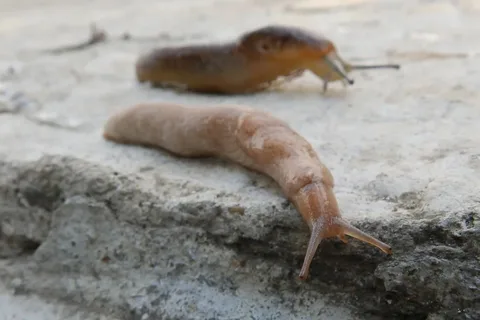
The Effects of Salt on Slugs and Your Garden
While salt is often used to kill slugs in gardens, it can have negative effects on your garden and the surrounding environment. When salt is applied to slugs, it draws moisture out of their bodies, leading to dehydration and death. However, when salt is spread around plants or in the soil, it can also affect the plants themselves. Salt can disrupt the balance of water in the soil, making it harder for plants to absorb the moisture they need to grow. This can lead to wilting, yellowing leaves, and poor plant health.
Another consequence of using salt in the garden is the impact it has on beneficial organisms like earthworms. Earthworms play a vital role in aerating the soil and breaking down organic matter. When exposed to salt, these worms can suffer the same dehydration as slugs, and their population can decrease. Without enough earthworms, your garden soil may become compacted, reducing its ability to retain water and nutrients. This can make it harder for your plants to thrive in the long run.
Salt can also harm other creatures in your garden, including beneficial insects, small animals, and birds. When salt seeps into the ground, it can contaminate the ecosystem, affecting the food chain. For example, birds that eat slugs or insects may be harmed by consuming animals affected by salt. Over time, the continued use of salt in gardens can create an imbalance in the local ecosystem, making it more difficult for plants and animals to survive.
In addition, excessive salt in the garden can affect the pH level of the soil. High salt concentrations can make the soil more acidic, which can harm plants that prefer neutral or slightly alkaline soil. This can lead to poor growth and lower crop yields for gardeners trying to grow vegetables or flowers. It’s important to consider the long-term effects of salt before using it in your garden.
In conclusion, while salt can be an effective way to control slugs in the short term, it can have harmful effects on your garden and the surrounding environment. Using salt too frequently can damage plants, harm beneficial organisms, and disrupt the balance of your garden’s ecosystem. It’s important to use alternative methods to control slugs to keep your garden healthy and thriving.
Why Do Slugs Die from Salt but Survive in Wet Environments?
Slugs die from salt because of how it affects their ability to retain water, but they thrive in wet environments because moisture is essential for their survival. Slugs have soft, moist bodies that rely on water to maintain their shape and function. In a wet environment, slugs can absorb water through their skin and stay hydrated, which is crucial for their survival. However, when salt is introduced to their environment, it disrupts this delicate balance by drawing water out of their bodies.
Salt has a strong effect on slugs because it causes a process called osmosis. Osmosis is when water moves from an area of low salt concentration (inside the slug’s body) to an area of high salt concentration (the outside environment with salt). This causes the slug to lose water quickly, leading to dehydration. Without enough water, a slug’s body can’t function properly, and it eventually dies. This is why slugs can’t survive in salty environments like they do in moist habitats.
In wet environments, slugs are able to stay hydrated because the moisture in the air or on the ground helps them maintain the necessary water balance. They can even absorb water directly through their skin from wet surfaces, like damp soil or leaves. This moisture allows them to stay healthy, move around, and find food without suffering from dehydration. Wet conditions also help slugs move more easily because their slimy mucus can form more easily when they are in a moist environment.
Another reason slugs survive in wet environments is that they have developed ways to protect themselves from drying out. They can hide under rocks, leaves, or soil to stay cool and moist during dry periods. When the weather is too hot or dry, slugs can slow down their activity or even seal themselves into a protective slime layer, which helps retain moisture. This adaptability is what allows slugs to live in wet, humid environments.
In conclusion, slugs die from salt because it causes them to lose water quickly through osmosis, leading to dehydration. In contrast, wet environments help slugs retain water, allowing them to stay hydrated and survive. Moisture is vital for slugs, and it’s the key to understanding why they thrive in humid conditions but perish when exposed to salt.
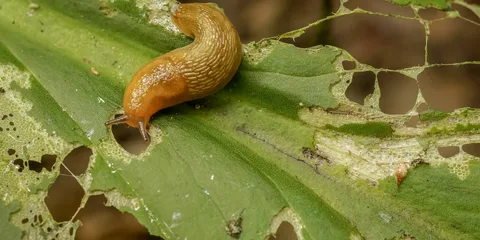
Conclusion
In conclusion, slugs are very sensitive to salt because it takes away the water from their bodies, which makes them dry out and die. This is why they can survive in wet, humid places where there’s plenty of moisture. Salt, on the other hand, dries them out too quickly, and they can’t handle it. Understanding this can help us figure out better ways to protect our gardens from slugs without causing harm to the environment.
While salt might seem like an easy solution to get rid of slugs, there are many other ways to keep them away that are kinder to nature. Using natural barriers, planting slug-repellent plants, and attracting helpful animals like birds can all help keep slugs out of your garden. It’s important to remember that slugs are part of the ecosystem, and finding safe solutions will keep your garden healthy and full of life.














Post Comment